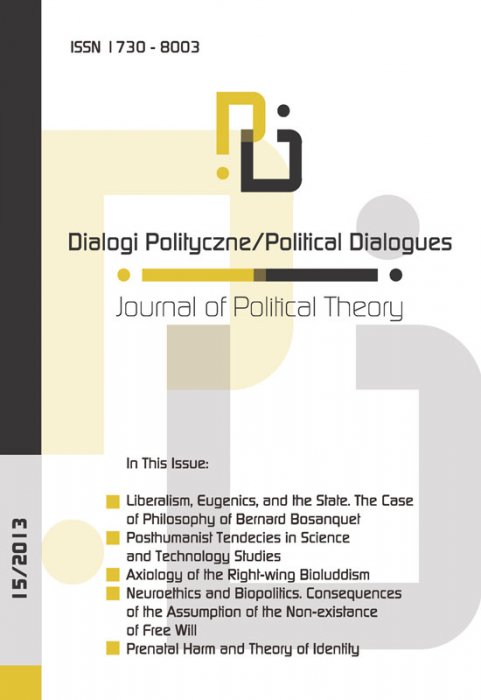Neuroethics and Biopolitics. Consequences of the Assumption of the Non-existence of Free Will
DOI:
https://doi.org/10.12775/DP.2013.004Słowa kluczowe:
neuroethics, biopolitics, free will, social responsibility, judgmental responsibility, paradigms of neuroethics, moralityAbstrakt
Both neuroethics and biopolitics are the newest discoveries of social sciences. They provide many problems and issues
concerning the human nature, critical for the current political thought. The mutual relation between them forces us also to focus on the solutions in legal system through the crucial meaning of the notion of responsibility – the critical issue of neuroethics. The main objective of this article, therefore, is to: 1) to characterize neuroethics and its main approaches; 2) to introduce the current consensus reached in the debate on the freedom of will; 3) to outline the possible biopolitical consequences within the frames of the described paradigm.
Bibliografia
Bechara A., Burns K. (2007). Decision Making and Free Will: A Neuroscience Perspective, “Behavioral Sciences and the Law”, No. 25, p. 263, 264, 274.
Blank R. H. (2011). Brain Sciences And Politics: Some Linkages, “Research In Biopolitics”, No. 9, p. 219.
Cacioppo J. T., Berntson G.G. (2005). Social neuroscience, Psychology Press, New York.
Capra F. (1996). The Web of Life: A New Scientific Understanding of Living Systems, Anchor Books Press, New York, p. 29.
Cranford R. E. (1989). The Neurologist as Ethics Consultant and As A Member of the Institutional Ethics Committee, “Neurologic Clinics”, No. 7, p. 697-713.
Dominiak Ł., Perlikowski Ł., Płotka B. (2013). Contemporary Biopolitical Divides in the Light of the Debate over Human Enhancement, “Studia Polityczne”, No. 31, p. 182.
Dworkin R. (2011). Justice for Hedgehogs, Harvard University Press, London, p. 221, 222, 220-223.
Esposito R. (2008). Bios. Biopolitics and Philosophy, University of Minnesota Press, London.
Esposito R. (2012). The Third Person, Polity Press, Cambridge, p. 6.
Fukuyama F. (2002). Our Posthuman Future. Consequences of the Biotechnology Revolution, Farrar, Straus and Giroux Press, New York, p. 182.
Gazzaniga M. (2005). The Ethical Brain. Dana Press, New York, p. 101-102.
Harlow J. M. (1848). Passage of an iron rod through the head, “Boston Medical and Surgical Journal”, No. 39, p. 389-393.
Harris S. (2010). The Moral Landscape. How Science Can Determine Human Values, Free Press, New York, p. 73-74, 75.
Harris S. (2012). Free Will, Free Press, New York, p. 96.
Horikawa T., Kamitani Y. (2013). Neural Decoding of Visual Imagery During Sleep, “Science”, No. 6132, p. 639-642.
Lasak J. M., Gorecki J. P. (2009). The History of Stereotactic Radiosurgery and Radiotherapy, “Otolaryngologic Clinics of North America”, No. 42, p. 593-599.
Libet B. (2002). Do We Have Free Will?, [in:] R. Kane, The Oxford Handbook of Free Will, Oxford University Press, New York, p. 551-564.
Machamer P. (2009). Learning, Neuroscience, and the Return of Behaviorism, [in:] J. Bickle, The Oxford Handbook of Philosophy and Neuroscience, Oxford University Press, New York.
Overskeid G. (2008). They Should Have Thought About the Consequences: the Crisis of Cognitivism and A Second Chance for Behavior Analysis, “The Psychological Record”, No. 58, p. 131-151.
Rożek T. (2011). Nauka po prostu. Wywiady z wybitnymi, Demart Press, Warsaw.
Roskies A. (2002). Neuroethics for the New Millenium, “Neuron”, No. 35, p. 21- 23.
Safire W. (2002). Visions for a New Field of “Neuroethics”. Neuroethics Mapping the Field Conference Proceedings, May 13-14, San Francisco, California.
Van den Enden H. (1979). Thomas Hobbes and the Debate on Free Will. His Present-Day Significance for Ethical Theory, “Philosophica”, No. 24, p. 187, 205-212.
Vatter M. (2013). Biopolitics: from Surplus Value to Surplus Life, http://biopolitica.cl/docs/vatter_biopolitics.pdf, Online access: 18 X 2013.
Pobrania
Opublikowane
Jak cytować
Numer
Dział
Statystyki
Liczba wyświetleń i pobrań: 434
Liczba cytowań: 0



